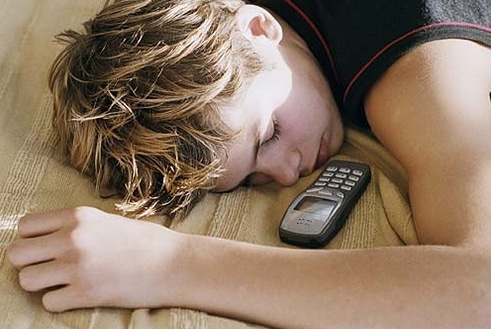In 2006, a study was conducted that showed that more than 80% of American high school students were suffering from sleep deprivation. Now 10 years later, the problem is still a massive concern for students, parents, schools and health care providers.
This is not a case of a few students losing an hour here or there; instead, this is a vicious cycle of teens losing hours of sleep every night as they try and catch up on their work, work they missed by being sleep deprived during the day. At its worst, students can find themselves struggling with their school work, which leads to greater stress, insomnia, depression and worse.
Studies have shown a strong link between teenagers sleep deprived and suicidal thoughts.
The longer the pattern continues, the less able students are to deal with their problems on an emotional level and the more likely they are to suffer from stress, anxiety and panic attacks. With suicide still accounting for a large number of deaths in young people, sleep deprivation is the last thing that teenagers need.
Something clearly has to change in order to deal with this national health issue, but how do teenagers break free of this cycle?
Dealing with this issue is not as simple as telling teenagers to close the books and get an early night.
There is an important reason why high school students feel trapped in this never-ending cycle of late nights, poor sleep and the symptoms of sleep deprivation in the morning – they are under too much pressure. Once the school day ends, there are so many academic, extra-curricular and social commitments that teens have to deal with, that they feel under pressure to manage them all. In order to get good grades, they need to study and work on their assignments.
The problem is that they more sleep deprived they are in class, the more they have to catch up on that night, so the issue just keeps spiraling out of control. Rather than cut back on activities, they want to be able to do it all so they do not disappoint friends and family that are relying on them. It also doesn’t help when these teenagers are so attached to their cell phones that they have further distractions to deal with.
A poll by the National Sleep foundation into teen sleep in 2011 showed that over 50% of teens asked texted in the hour before sleep and 60% used a laptop. Some even fall asleep with their phones in their hand.

This pressure to succeed is why high school students cannot simply close the books and forget about an assignment until the next day. As for getting an early night, teenagers are just not biologically suited to early nights. As children reach high school age, their internal body clock experiences a shift that turns them into night owls. It becomes more difficult to fall asleep before 11 pm, so kids simply stay up to study, socialize or just play games until they fall asleep.
The problem with sleep deprivation does not so much lie in the time that students go to bed but when they wake up. They just can’t handle the early start times of classes in the same they could when they were younger. This is where the problems of poor concentration and other symptoms start to affect school performance.
What can be done to help high school students overcome sleep deprivation?
The answer here may be to start the school day later, so kids can get more sleep and perform better in their first classes.
A 2012 study into the habits of other nations supports this approach. In South Korea – a country with high teen suicide rates – school can start as early as 7 am and students reportedly slept for an average of 4.9 hours. In Australia, however, school starts much later and students are not as sleep deprived. This approach was trialed in a suburb of Minneapolis in the late nineties so the school could monitor effects on their students.
By shifting the start time of the school day by one hour, the high school observed that the students showed fewer teenagers sleep deprived and fewer signs of depression. These results were then replicated in 1997 when the entire school district changed the start time.
It can also help if students adopt a strong bedtime routine across the week, one that can be upheld by their parents. A good teen sleep relies on keeping that circadian rhythm in check and this means a regular bedtime and wake-up time, even on weekends. Teachers have found that the best students with the highest grades are the ones that keep up this schedule and don’t have long lie-ins and later nights on the weekend. There are also suggestions that teenagers with a bedtime routine that is enforced by parents are much happier and able to stick with it.
A change in the school day and an understanding of the teenage circadian rhythm can make a massive difference in the number of teenagers sleep deprived.
The alertness and mood of a school student can be dramatically improved by allowing them to go to sleep at a time that suits their body clock and by letting them sleep for longer.
This change in mood and cognitive ability means that students are able to concentrate in class and improve their academic performance. Improvements in the class should then reduce the need to catch up on studies at night and reduce the stress and pressure that these students are feeling. Reduced stress and a better night’s sleep should also have an impact on depression and suicidal thoughts.
There is a clear domino effect here that can have massive implications on the health and mental state of high school students.
The idea of shifting the school day by an hour and encouraging a regular bedtime routine may sound simplistic, but they have been proven to work. If all schools, parents, and students take the time to understand teen sleep and the vicious cycle that teenagers are in and put these measures into practice, high school students could be happier, more productive and, above all, much healthier.
